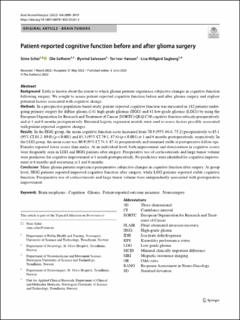| dc.contributor.author | Schei, Stine | |
| dc.contributor.author | Solheim, Ole | |
| dc.contributor.author | Salvesen, Øyvind | |
| dc.contributor.author | Hansen, Tor Ivar | |
| dc.contributor.author | Sagberg, Lisa Millgård | |
| dc.date.accessioned | 2023-05-23T08:25:27Z | |
| dc.date.available | 2023-05-23T08:25:27Z | |
| dc.date.created | 2022-06-07T15:42:43Z | |
| dc.date.issued | 2022 | |
| dc.identifier.citation | Acta Neurochirurgica. 2022, 164 (8), 2009-2019. | en_US |
| dc.identifier.issn | 0001-6268 | |
| dc.identifier.uri | https://hdl.handle.net/11250/3068613 | |
| dc.description.abstract | Background
Little is known about the extent to which glioma patients experience subjective changes in cognitive function following surgery. We sought to assess patient-reported cognitive function before and after glioma surgery and explore potential factors associated with cognitive change.
Methods
In a prospective population-based study, patient-reported cognitive function was measured in 182 patients undergoing primary surgery for diffuse glioma (141 high-grade gliomas (HGG) and 41 low-grade gliomas (LGG)) by using the European Organisation for Research and Treatment of Cancer (EORTC) QLQ-C30 cognitive function subscale preoperatively and at 1 and 6 months postoperatively. Binomial logistic regression models were used to assess factors possibly associated with patient-reported cognitive changes.
Results
In the HGG group, the mean cognitive function score increased from 70.9 (95% 66.6, 75.2) preoperatively to 85.1 (95% CI 81.2, 89.0) (p < 0.001) and 83.3 (95% CI 79.1, 87.6) (p < 0.001) at 1 and 6 months postoperatively, respectively. In the LGG group, the mean score was 80.9 (95% CI 74.4, 87.4) preoperatively and remained stable at postoperative follow-ups. Females reported lower scores than males. At an individual level, both improvement and deterioration in cognitive scores were frequently seen in LGG and HGG patients after surgery. Preoperative use of corticosteroids and large tumor volume were predictors for cognitive improvement at 1 month postoperatively. No predictors were identified for cognitive improvement at 6 months and worsening at 1 and 6 months.
Conclusion
Many glioma patients experience perioperative subjective changes in cognitive function after surgery. At group level, HGG patients reported improved cognitive function after surgery, while LGG patients reported stable cognitive function. Preoperative use of corticosteroids and large tumor volume were independently associated with postoperative improvement. | en_US |
| dc.language.iso | eng | en_US |
| dc.publisher | Springer | en_US |
| dc.rights | Navngivelse 4.0 Internasjonal | * |
| dc.rights.uri | http://creativecommons.org/licenses/by/4.0/deed.no | * |
| dc.title | Patient-reported cognitive function before and after glioma surgery | en_US |
| dc.title.alternative | Patient-reported cognitive function before and after glioma surgery | en_US |
| dc.type | Peer reviewed | en_US |
| dc.type | Journal article | en_US |
| dc.description.version | publishedVersion | en_US |
| dc.source.pagenumber | 2009-2019 | en_US |
| dc.source.volume | 164 | en_US |
| dc.source.journal | Acta Neurochirurgica | en_US |
| dc.source.issue | 8 | en_US |
| dc.identifier.doi | 10.1007/s00701-022-05261-3 | |
| dc.identifier.cristin | 2029999 | |
| cristin.ispublished | true | |
| cristin.fulltext | original | |
| cristin.qualitycode | 1 | |

